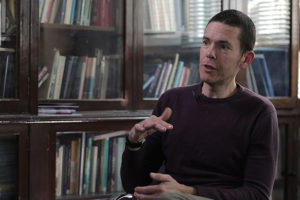Eskimo-Aleut Languages
Linguist Michael David Fortescue on the rare polysynthesis of the Eskimo languages, the role of affixes in the...
The video is a part of the project British Scientists produced in collaboration between Serious Science and the British Council.
Dyslexia is a very strange condition. It means inability to learn to read. And you might think: surely that could be explained by not having the right home environment, not having the right teacher, not having the right school or maybe being really very stupid. But none of these applies. There is really a condition that means that you cannot learn to read as well, as quickly, as you can learn to do all other things. So, it’s a very specific kind of difficulty, a problem, and what people have always been suspicious about is, why should it have to do with reading? Reading after all has been invented only about three thousand years ago, and mass literacy has not been around for more than possibly a hundred years: even now there are many people who are not literate. So how can there be a condition based on an ability that must be based in the brain that has to do just with the reading?
It turns out that the ability is about something else, which affects learning to read and, interestingly, it is an ability that has to do with speech. Not language, but speech. And it has to do with a particular possibility of segmenting speech into tiny little sounds that can be matched up to letters. So, if you hear the word “cat”, it’s actually one sound, but when you are literate, when you are person who can spell [c] [a] [t], it seems to you that you can separate “cat” into [c] [a] [t], but actually you cannot put them together like „cat“, it is just completely separate. It is a very artificial way of breaking up the sound of speech. So, in a language that has a writing system that’s not based on the alphabet, this problem does not arise, so dyslexia is something pretty specific to the alphabet, to the use of the alphabet, and if you have a difficulty in mapping individual speech sounds to letters, you will find it very difficult to learn to read and to spell. It does not make sense to you.
So when a child is struggling to read and the word is „lion“, the teacher might say, [l], [l], to help the child, the child may suddenly say “tiger”, because there’s so little relationship to this sound, it gets so little help from this. Another child will maybe use [l] to produce the word „lion“. So, it is this difficulty at the heart of dyslexia and it is very interesting, because it tells us something about how we master speech in general and how it comes that, you know, 95 percent of the population has no problem, but maybe 5 percent of the population do have problems, and again it can be a spectrum of severe difficulty and very mild difficulty. It means that we do have children who struggle enormously in learning to read and to spell and they need years and effort, and they have to believe very often that they are just very stupid and which just isn’t the case.
So, it is a very sensitive test of this phonological difficulty and in this way we could diagnose people who did not even know that they were dyslexic, even adults who had a dim memory of school and say: „Ah, I did not like, it was a terrible time and yeah, I was never a good speller and I could not do it very well.“ And we could find that there is indeed an area in the brain, again, it is not just the one area, it is several that are connected with a particular highway in the brain that they have a different kind of activation when they do these tasks, these phonological tasks and in this sense, dyslexia has revealed something not so much about reading and literature, but about speech and how we process it. Spelling is a very interesting activity in English, because the way a word sounds and the way it looks can be very disparate from each other.
So, take the word „cough“, it is not [c] [o] [f], it is [c] [o] [u] [g] [h] . Now, if you are dyslexic, that is a real problem for you to remember and if you have this sound [o] [u] [g] [h], it is not always [of], it can be [au] sometimes, so the pronunciation could be very very changeable and that is why in English, in the English language, wherever it is spoken, wherever it is taught, dyslexia will be very prominent, but in languages where the way that the writing system is produced so that it is really transparent and really maps very clearly onto sounds, dyslexia is much less evident.
Now, we have done a study of this with Italian speakers. Italian is a beautiful language, who has a system that is very transparent, if you think of a word like “mi-la-no” or “sa-la-mi”, it is consonant-vowel-consonant-vowel, it is very reasonable and easy to split these up into different phonemes. So, even if you have a problem with phonology, even if you are destined to be dyslexic, if you have a good fortune to be born Italian, you will learn to read and to write much more quickly than if you were born into a country where they speak English. Dyslexia defined as a problem with phonology is a genetic problem and it is very strong heritable.
So, in Italy, we can identify these people as much, even though they have actually very little problem in reading. So, some people might say: “Let’s not call them dyslexic”. Well, they are called dyslexic for traditional historical reasons because there are difficulties in learning to read using the alphabet. Even the Italian dyslexic children, it turns out, read more slowly, learn more slowly than the non-dyslexic children. So, there is an environmental component, a cultural component in the way the problem manifests itself in reading problems. Interesting biological effects which are universal, regardless of language, and their cultural effects which mean that there are big differences, according to language, whether, in fact, you have a reading and writing problem.

Linguist Michael David Fortescue on the rare polysynthesis of the Eskimo languages, the role of affixes in the...

Linguist Maria Polinsky on polar questions, strategy of asking in different languages, and cross-linguistic un...

Geographer Mathias Disney on the chemistry of photosynthesis and why we depend on it